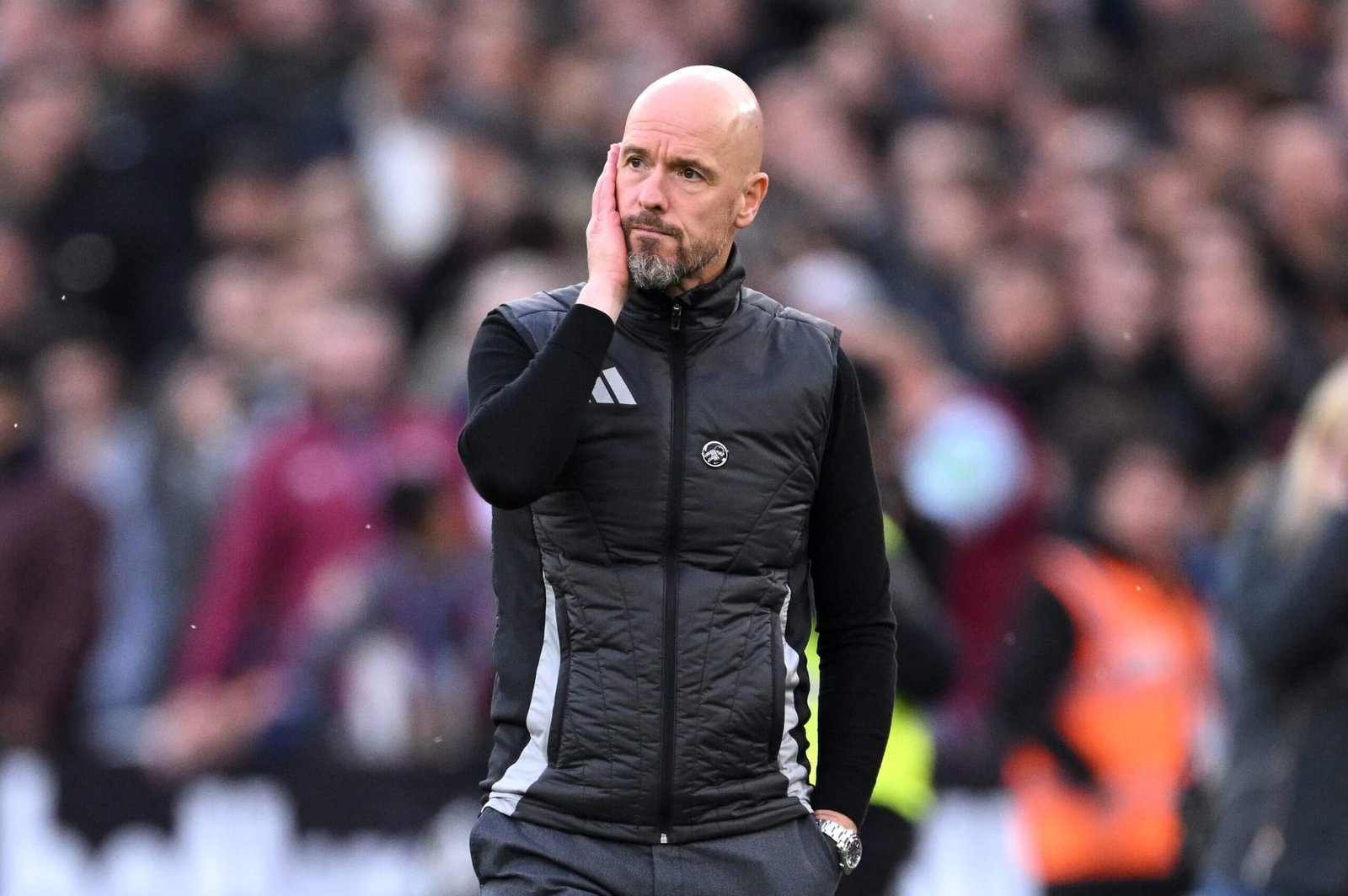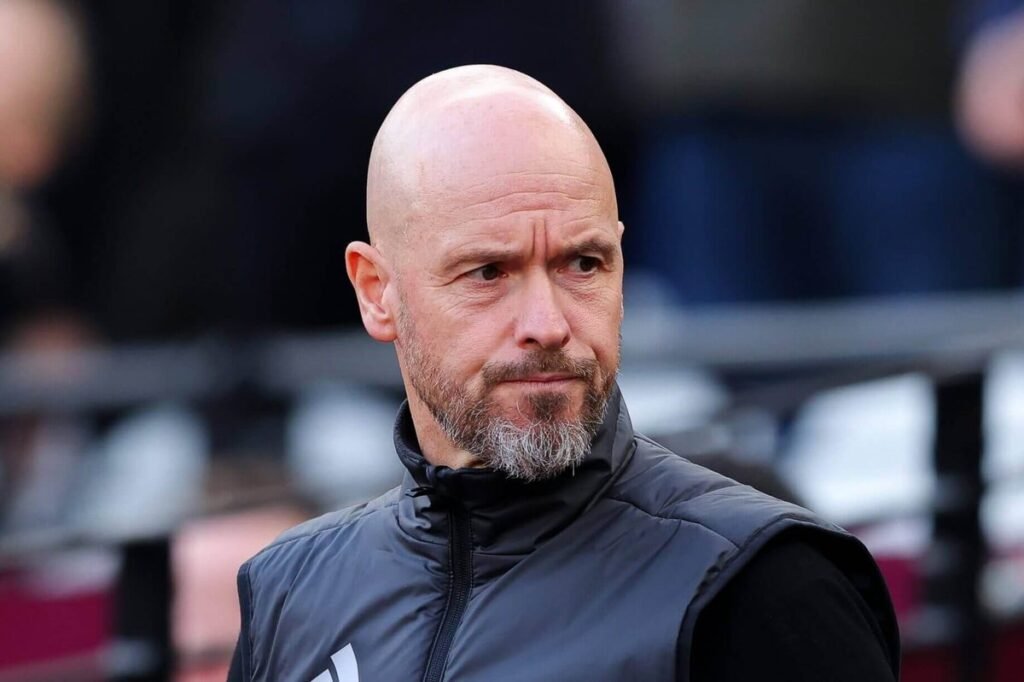Erik ten Hag has been sacked as Manchester United manager.
The Dutchman was informed on Monday morning and leaves Old Trafford after two and a half years in charge with his final game proving to be the Premier League defeat to West Ham United on Sunday.
That result left the club 14th in the table, seven points off the Champions League qualification places, after just three league wins from nine games and only four in 14 in all competitions.
The club are now working on next steps with former striker Ruud van Nistelrooy, recruited in the offseason to work alongside Ten Hag, having been asked to take charge on an interim basis with the rest of the management staff remaining in position for now.
A statement later on Monday confirmed the news, which read: “Erik ten Hag has left his role as Manchester United men’s first-team manager.
“Erik was appointed in April 2022 and led the club to two domestic trophies, winning the Carabao Cup in 2023 and the FA Cup in 2024.
“We are grateful to Erik for everything he has done during his time with us and wish him well for the future.”
Ten Hag was retained as United manager in the summer after an end-of-season review following an eighth-place Premier League finish, the club’s lowest since 1990, and a FA Cup final victory over rivals Manchester City.
United triggered a one-year extension option in the 54-year-old’s contract at the start of July. His previous deal, which he signed when he was appointed in 2022, was due to expire in 2025.
However, another hugely disappointing run of form to start the new season has prompted key decision-makers, including chief executive Omar Berrada, sporting director Dan Ashworth and technical director Jason Wilcox, to recommend a change.
United kept Ten Hag in position following the FA Cup win (Michael Regan – The FA/The FA via Getty Images)
The Athletic revealed during the international break that the United hierarchy were scheduled to meet in London while also reporting that Ten Hag’s performance as manager and possible departure was to be discussed at the meeting.
In Ten Hag’s first season at United, he guided them to a third-place finish and oversaw their Carabao Cup triumph, ending a six-year run without a trophy.
Last year, though, United struggled domestically and in Europe, suffering a group-stage exit from the Champions League, and only qualified for the Europa League this season by winning the FA Cup.
United had sounded out potential replacements including now England head coach Thomas Tuchel, newly-appointed USMNT coach Mauricio Pochettino, former Brighton & Hove Albion head coach Roberto De Zerbi, Brentford head coach Thomas Frank and Ipswich Town manager Kieran McKenna.
But at the end of a process led by co-owner Sir Jim Ratcliffe and INEOS sporting director Sir Dave Brailsford, the choice was made to move forward with Ten Hag.
United were active in the summer transfer window, signing Matthijs de Ligt, Leny Yoro, Joshua Zirkzee, Manuel Ugarte and Noussair Mazraoui for a combined spend of approximately £205million ($274m), including add-ons.
Following the end of the transfer window and just hours before the Liverpool defeat, Berrada said Ten Hag had the “full backing” of the club’s hierarchy.
Ten Hag previously managed Ajax for four and a half years before taking the United job in 2022. He has also coached fellow Dutch sides Go Ahead Eagles and FC Utrecht, either side of a two-year spell as the head coach at Bayern Munich’s reserve side.
United are next in action against Leicester City in the League Cup at Old Trafford on Wednesday.
‘United finally run out of patience’
Analysis from Manchester United correspondent Mark Critchley
For United’s key decision-makers to finally part ways with Ten Hag after a narrow defeat in highly controversial circumstances may come as a surprise to some.
Yet with his side sitting 14th in the table, having won only four of their 14 games in all competitions this season, others may ask what the sense was in waiting any longer? Increasingly, keeping Ten Hag in place felt like delaying the inevitable.

Defeat at West Ham proved to be Ten Hag’s last game in charge (Justin Setterfield/Getty Images)
Despite a summer of change above and around him, as well as more than £200million spent on the playing squad, neither results nor performances have notably improved since last season.
Ten Hag clung to the argument that two trophies in two seasons represented progress, but few bought it as results stagnated, and unless there was significant improvement, his superiors were always likely to run out of patience too.
The decision marks a reversal by the INEOS-led hierarchy, who backed Ten Hag when triggering a one-year extension in his contract during the summer, a month on from the remarkable FA Cup final victory over Manchester City at Wembley.
It will now fall to that newly-installed football structure — led by chief executive Omar Berrada and sporting director Dan Ashworth — to select Ten Hag’s successor in a bid to salvage the season.
How bad had it got?
Analysis from Senior Data Analyst Mark Carey
Without even considering the recent performances on the pitch, a zoomed out view of United’s results indicates just how badly their stock has fallen among the European elite.
Using data from ClubElo — a measure of team strength that allocates points for every result, weighted by the quality of the opposition faced — we can track United’s rating over the last decade and beyond.
Peaks and troughs are typical of any team, but the graphic below highlights how United’s dominance has declined. After a notable slide following Ferguson’s retirement in the summer of 2013, fortunes picked up under Jose Mourinho and Ole Gunnar Solskjaer.
However, there has been little reason for optimism since Ten Hag arrived when United’s ClubElo rating hit an all-time low in the post-Ferguson era. There have been some green shoots of recovery at times, but barely enough to hold onto in the long-term.
Comparisons with the glory days are inevitable, but it is only when you map out United’s output over time that the scale of the issues becomes so clear.
(Top photo: James Gill – Danehouse/Getty Images)
Read the full article here

